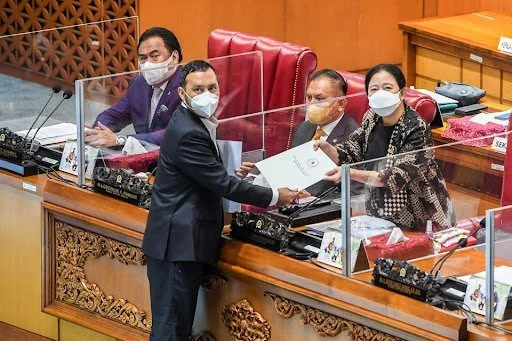Indonesia Passes Historic Sexual Violence Prevention Bill
Speaker of the House Puan Maharani, right, with Willy Aditya, Chairperson of the working committee of the bill to tackle sexual violence, left, after it was passed by Indonesia's parliament, in Jakarta, Indonesia, April 12, 2022. Photo: Reuters/Antara Foto/Galih Pradipta
On Tuesday, the Indonesian House of Parliament in Jakarta passed the historic Sexual Crimes Bill (TPKS). The bill was first proposed in 2012 by the National Commission on Violence Against Women and was finally introduced to the Parliament four years later after a widely publicized fatal gang-rape of a child on the island of Sumatra sparked a national outcry for more action by the government.
The comprehensive bill passed last week is designed to focus on prevention, victim recovery and compensation. It criminalizes nine forms of sexual violence which include sexual harassment, forced sexual mutilation, and sexual slavery. The bill also expands victim rights in court, allowing victims greater access to a fair trial and restitution funds, and recognizes men and boys as victims of sexual violence.
TPKS faced criticism from conservative groups who wanted the bill to criminalize adultery and LGBT relationships. The religiously conservative Prosperous Justice Party (PKS), representing the largest Muslim-majority population in the world, was not satisfied with the lack of “prohibition and punishment of perpetrators of adultery and sexual deviations.”
Pushback from conservative groups had stalled the bill for over six years, and these groups maintain that "the parliament has ignored input from the public who objected to the passing of this bill." They successfully prevented the passage of the bill previously, having relegated TPKS to non-priority status in 2020. However, a sharp uptick in sexual violence at schools in the last two years forced the parliament to reevaluate the government response to the issue.
“It can be said that the situation is critical. We are not only experiencing the COVID-19 pandemic, but also a sexual violence pandemic,” Education Minister Nadiem Makarim said at an online discussion.
Activists hold an International Women's Day protest in Surabaya, East Java, on March 8, 2022. Photo: Getty Images/Suryanto–Anadolu Agency
On Tuesday, the Indonesian House of Parliament in Jakarta passed the historic Sexual Crimes Bill (TPKS). The bill was first proposed in 2012 by the National Commission on Violence Against Women and was finally introduced to the Parliament four years later after a widely publicized fatal gang-rape of a child on the island of Sumatra sparked a national outcry for more action by the government.
The comprehensive bill passed last week is designed to focus on prevention, victim recovery and compensation. It criminalizes nine forms of sexual violence which include sexual harassment, forced sexual mutilation, and sexual slavery. The bill also expands victim rights in court, allowing victims greater access to a fair trial and restitution funds, and recognizes men and boys as victims of sexual violence.
TPKS faced criticism from conservative groups who wanted the bill to criminalize adultery and LGBT relationships. The religiously conservative Prosperous Justice Party (PKS), representing the largest Muslim-majority population in the world, was not satisfied with the lack of “prohibition and punishment of perpetrators of adultery and sexual deviations.”
Pushback from conservative groups had stalled the bill for over six years, and these groups maintain that "the parliament has ignored input from the public who objected to the passing of this bill." They successfully prevented the passage of the bill previously, having relegated TPKS to non-priority status in 2020. However, a sharp uptick in sexual violence at schools in the last two years forced the parliament to reevaluate the government response to the issue.
“It can be said that the situation is critical. We are not only experiencing the COVID-19 pandemic, but also a sexual violence pandemic,” Education Minister Nadiem Makarim said at an online discussion.


